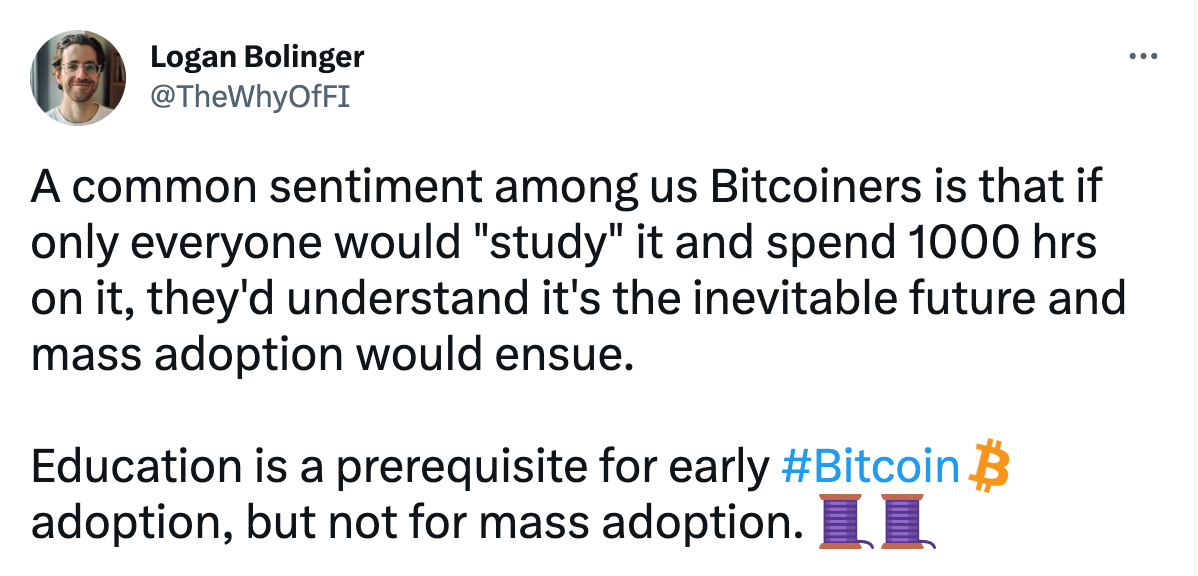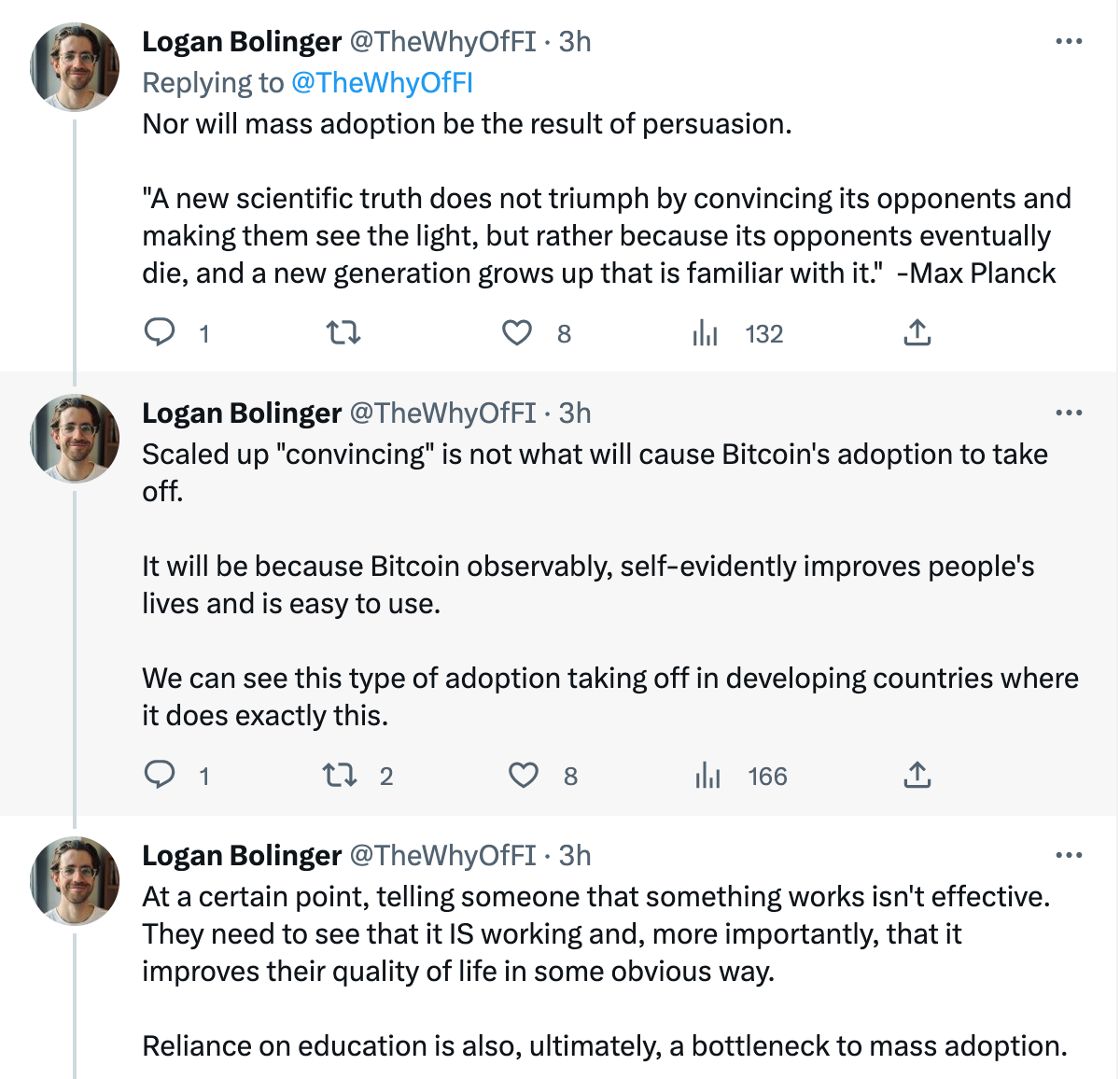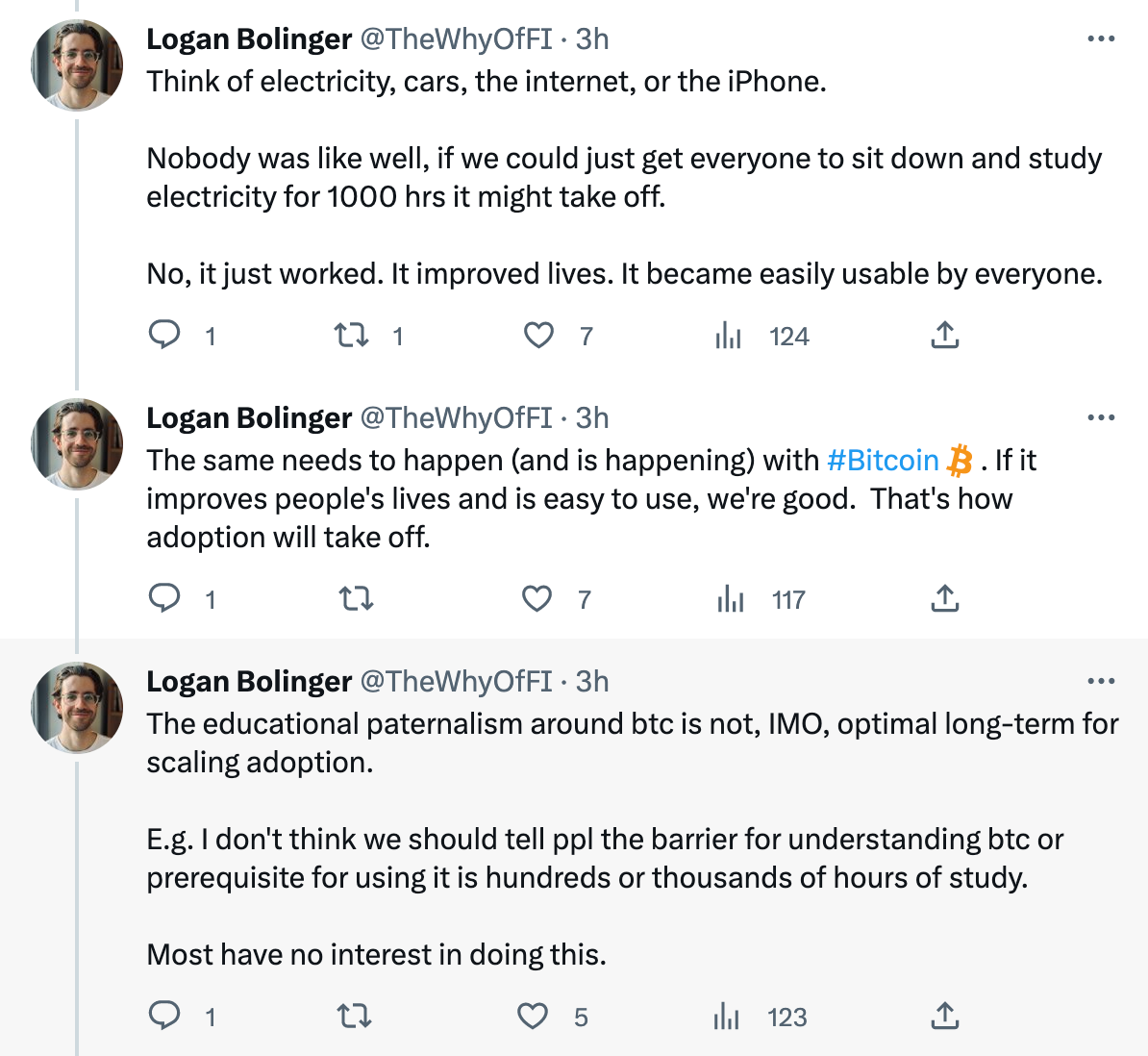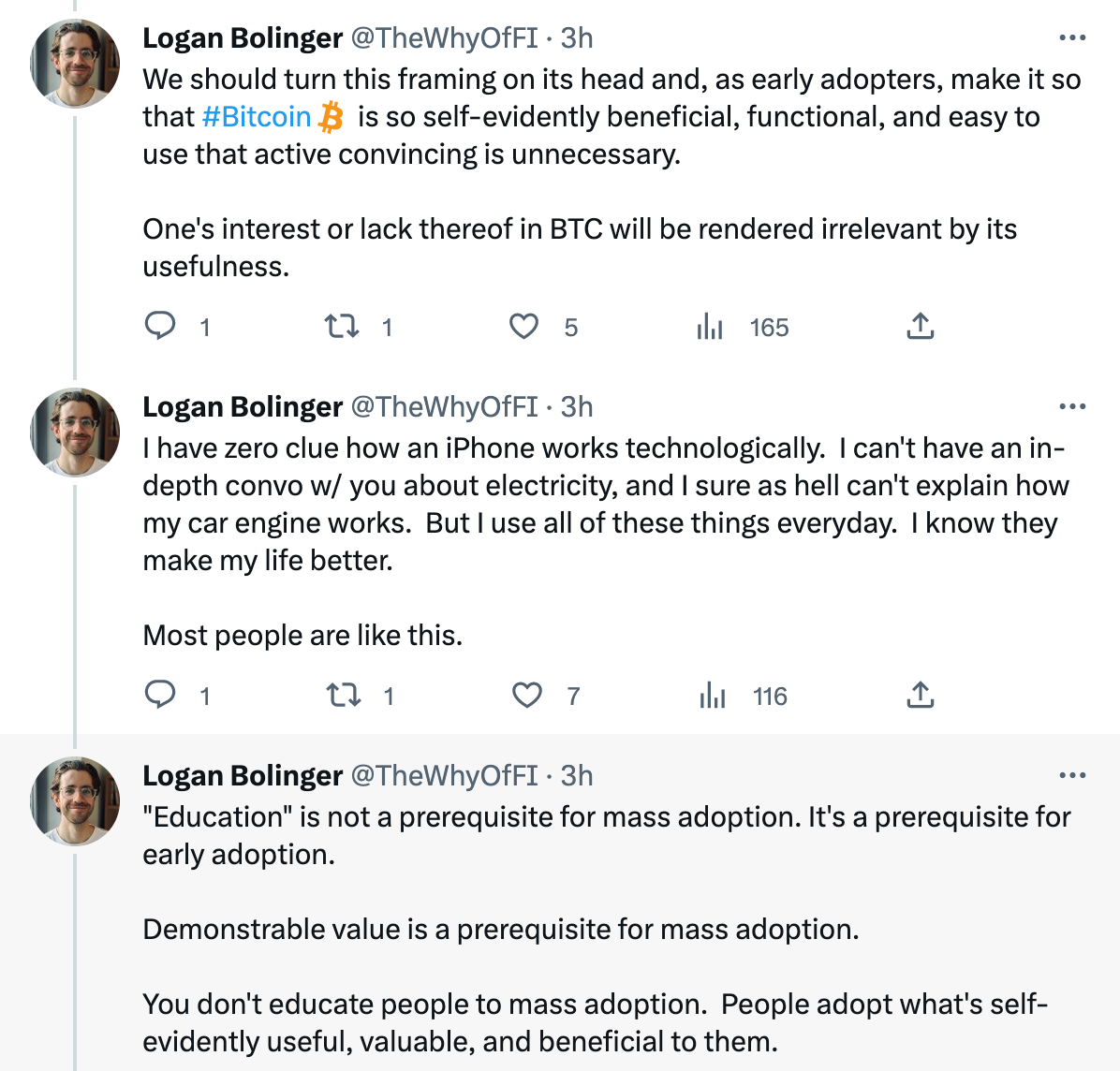Hey friends, welcome back to Think Bitcoin™ for issue #48. Special welcome to the new subscribers. I’m glad you’re here. As always, if you have any questions or comments, feel free to reach out. You can also find me on Twitter (@TheWhyOfFI) and connect with me on LinkedIn. I’m also on Nostr at npub1zx0uydq67a62k5vhjcsvh0qvedk9ht9gz9t56et6j9k7wayj809qjghdct
In this issue:
Long Reads: 4000 Weeks of Life and Bitcoin
As always, if you find this newsletter interesting or useful, please share it with others who might find it interesting or useful, too!
This issue is sponsored by Orange Pill App. Connecting with other Bitcoiners is a great experience. Many of my own most interesting conversations each day occur with fellow Bitcoiners. Whether in real life or online, you can skip formalities and get right to discussing the transformative, wide-ranging effects of Bitcoin’s growth, knowing you share a hope for a more promising future. Thanks to Orange Pill App you are now able to meet Bitcoiners near you without the need to go to a meet-up or a conference. Sign up now!
Long Reads
4000 Weeks of Life and Bitcoin
“Time is the substance I am made of. Time is a river which sweeps me along, but I am the river; it is a tiger which destroys me, but I am the tiger; it is a fire which consumes me, but I am the fire.”
-Jorge Luis Borges
The average length of a typical human life on this planet is about 4000 weeks. This seemingly paltry allotment serves as the title for Oliver Burkeman’s book, Four Thousand Weeks, which, though it purports to be a book about time management, is probably more accurately described as a book about our relationship with time and how we might go about cultivating a more fulfilling one.
I want to argue that Bitcoin has an important role to play in repairing our collective relationship to time because, with broad adoption, it can force systemic changes, the effects of which can positively redound to the quotidian experience of everyday people.
Burkeman gives some tips and advice on how to more productively reconstruct our relationship to time on an individual level, leaving the onus to each and every one of us. It’s not that this isn’t constructive or helpful. It’s both. But without changing the overarching environment that creates these problems in the first place, the disjunction between what’s economically necessary and what’s teleologically healthy will persist.
Let’s define the problem, though, before we get to Bitcoin’s role.
Burkeman’s book is about how the ideas we’ve developed about time and how to use it are actually counterproductive, making us less content, and generally causing an endemic sort of existential anxiety (which can also be paralyzing).
We who live in the post-agrarian, post-industrialized, hyper-connected, and extraordinarily financialized modern world view time as a resource, which is to say something external to ourselves, something to be used (well or poorly), something to be mastered, subordinated, and ruthlessly directed toward ends.
Viewing time as a resource carries with it the intimation that it isn’t infinite. This is uncomfortable, so we deal or, more accurately, avoid dealing with it in a variety of ways.
Some of us attempt to master our time, utilizing all the productivity hacks, pursuing perfect morning routines, seeking “time wealth,” and generally trying to exert more control so that we can be “free” to accomplish more things, to use our finite time well (or at least to achieve the most ends).
Some of us procrastinate, which, in Burkeman’s words, “is another means of maintaining the feeling of omnipotent control over life - because you needn’t risk the upsetting experience of failing at an intimidating project, obviously, if you never even start it.”
Some of us feel a kind of paralysis, unable to make choices of what to do or what to commit to, because the act of choosing necessarily precludes other choices which, when our time is finite, feels potentially like the tragic forfeiture of more optimal or more interesting life paths.
Recall the T.S. Eliot line from “Burnt Norton:”
Footfalls echo in the memory
Down the passage which we did not take
Towards the door we never opened
Into the rose-garden.
These echoes of paths not taken tend to haunt us because we do not get an inexhaustible amount of life in which to pursue all available paths. This means loss is always a part of the equation. Missing out is a fundamental part of our experience.
And this hurts, so we do all sorts of things, employ all sorts of strategies to not feel this. Busyness, procrastination, refusal to make choices or commit, etc. all serve the same purpose of making us ether believe that we can get everything done and experience everything or else forget the painful falsity of this belief. It’s all a failure or refusal, conscious or subconscious, to soberly confront our own finitude.
“Haste is universal because everyone is in flight from himself.” -Nietzsche
Bitcoiners will recognize this ubiquitous, culturally reinforced haste because it’s also part and parcel of the fiat experience. The fiat monetary system supercharges this haste. In response, we deify busyness (or reframe it as “hustle”) to not break at the thought of keeping up, staying ahead, not losing our place.
But at what cost?
In Burkeman’s words:
“The more you try to manage your time with the goal of achieving a feeling of total control, and freedom from the inevitable constraints of being human, the more stressful, empty, and frustrating life gets. But the more you confront the facts of finitude instead - and work with them, rather than against them - the more productive, meaningful, and joyful life becomes.”
So we view time as a resource, something to be directed toward an end, something to be used well in order to reach some magical time in the future when things are more fulfilling. We treat time instrumentally.
The fiat system we find ourselves in incentivizes this ethos. The treadmill of inflation and monetary debasement, and all the downstream effects resulting therefrom, make directing one’s gaze almost exclusively to the future a necessity.
After all, if you let up for a second, if you fail or opt not to use every minute of your time instrumentally toward a future end, you risk falling behind.
Burkeman acknowledges as much:
“Admittedly, it’s not entirely our own fault that we approach our finite time in such a perversely instrumental and future-focused way. Powerful external pressures push us in this direction, too, because we exist inside an economic system that is instrumentalist to its core.”
I think Bitcoin is a unique antidote to a lot of this and, perhaps, an opportunity to realign ourselves with time in ways that promise more contentment, more presence, and more fulfillment.
If the money you earn by providing value to the world maintains its purchasing power across time and space, then you can live with less anxiety about the state of your future resources. You don’t have to instrumentalize every moment, directing them toward the acquisition of resources to shore you up against the uncertainties of the future and the relentless debasement of your unit of account. Moreover, the financial opportunity cost of not treating time in a ruthlessly instrumental way is not as brutal or crippling.
Think of it this way. Trying to hold purchasing power in fiat is like trying to hold sand in your hands. It gradually, unavoidably slips between your fingers and falls away. You’re always losing some of it. Which of course means you always need to be acquiring more of it and doing so faster, and faster, and faster. If you aren’t constantly seeking to acquire more, the sand in your hand dwindles. In such a state of affairs, who would pause from collecting sand in order to do anything else? Who would not fix his/her mind solely on ensuring the acquisition of sand never ceased?
In such a scenario, we would fantasize about the day we finally had enough sand to be able to relax and live our lives. But this day never arrives. The potential of Bitcoin is not having to tell yourself that there’s some magical time in the future where you’ll have everything just right to be able to actually start living.
While fiat is fundamentally anti-presence, Bitcoin is the soil in which we can start to reclaim it.
We often contextualize Bitcoin as a historic development in the evolution of money. But, just as importantly, it’s also a historic development in the evolution of our relationship with time.
Just as the invention and proliferation of clocks radically transformed our relationship with time, so too will Bitcoin radically transform our relationship with time.
More writing to come on this topic.
Threads
A Note on My Unannounced Hiatus in January
As some of you may have noticed, I was conspicuously absent during most of January. I only published one issue of Think Bitcoin, and I was largely silent on Twitter. There are two reasons for this. First, sometimes life just gets in the way. Between work and parenting, bandwidth is sometimes hard to come by.
And I am committed to never spamming your email with ideas I don’t think are interesting or writing that I half-assed. I don’t believe in producing content for content’s sake.
To that end, reason number two is that sometimes I find it useful to sort of temporarily unplug a little bit, particularly from Bitcoin inputs. I know this probably sounds like heresy to some, but I find it to be a really restorative clearing of the mind to intentionally step away for short, temporary periods. Gives me the space to think about new ideas and reflect on older ones.
All that being said, consistency is also important. So while I very firmly believe in not publishing unless I’ve got something to say and very sincerely reject the content-for-content’s-sake ethos of our day, I need to make sure I’m putting myself in a position to be able to deliver interesting content to you on a regular, mostly uninterrupted basis.
Can I promise you there won’t be future unannounced hiatuses? Of course not.
Can I promise to do my best to balance things in a way that leads to more efficient idea generation and exploration? Yes I can.
Forgive me for the absence, friends. Thanks for sticking around.
As always, thanks for reading! If you enjoyed it or found it useful, share this newsletter widely and freely!
In the meantime, as Bob Dylan said, “Don’t follow leaders, and watch your parking meters.”
See you next time,
Logan
SPONSORSHIP INQUIRIES: If you’re a Bitcoin company (or you work for a Bitcoin company) and you’re interested in supporting the newsletter, please reach out via Twitter DMs (@TheWhyOfFI) or email (askthewhyoffi@gmail.com).
SUPPORT
Send bitcoin to my Strike
SOCIAL
DISCLAIMER: I am not investment advisor and this is not investment advice. This is not, nor is it intended to be, a recommendation to buy or sell any security or digital asset. Nothing in this newsletter should be interpreted as a solicitation, a recommendation, or advice to buy or sell any security or digital asset. Nothing in this newsletter should be considered legal advice of any kind. This newsletter exists for educational and informational purposes only. Do your own research before making any investment decisions.
© Copyright Logan Bolinger, Think Bitcoin LLC









